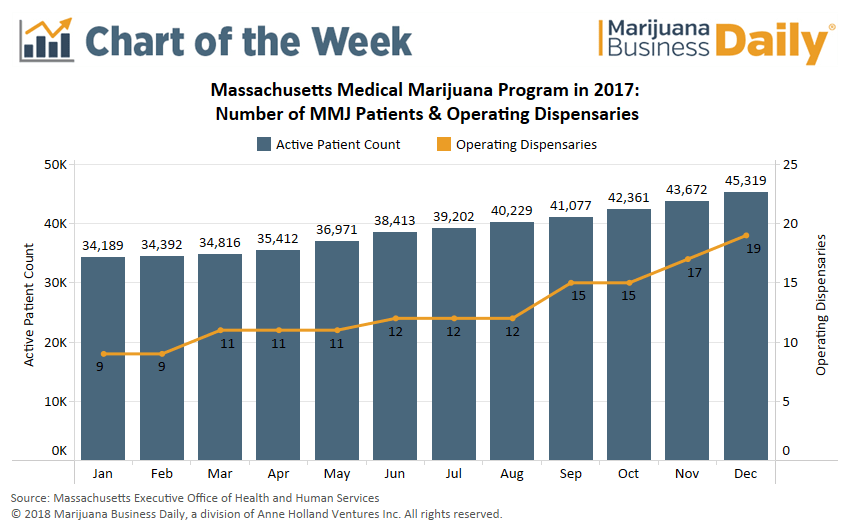The number of operating dispensaries in Massachusetts finally reached double-digits in 2017, a milestone for a program that has taken steps to bolster patient counts and witnessed a substantial boost in MMJ sales.
Over 11,000 patients were added to Massachusetts’ MMJ program throughout last year – a 34% increase – with average monthly patient growth coming in at a moderate 2.5%.
However, the increased number of operating dispensaries, 19 as of December, had an even bigger impact on MMJ sales. Patients purchased over 260,000 ounces of MMJ in 2017, an 80% increase from the 116,000 ounces sold in 2016.

Here’s what you need to know about the situation:
- The lack of dispensaries in Massachusetts has been driven by licensing bottlenecks at the local level. Businesses are required to obtain approval from both the state and the municipality where they plan to operate, a condition that has kept many dispensaries from opening their doors. Without local approval, a dispensary cannot open – a stipulation some towns are using to ward off unwanted MMJ outlets.
- Further growth may be in store for Massachusetts’ MMJ program. Revised rules now allow nurse practitioners to recommend MMJ and authorize dispensaries – which grow and process all the MMJ they sell – to cultivate cannabis from plant clippings instead of just seeds. Furthermore, the requirement that dispensaries operate as nonprofit entities has been lifted, allowing existing dispensaries to convert to a for-profit business and new licensees to apply as a for-profit entity. The change should simplify how dispensaries access and manage capital.
- Nearly 100 dispensaries have provisional certificates from the state, awaiting further inspection and local approval before they’re allowed to sell MMJ. Many of these dispensaries, however, likely have their eye on the state’s recreational market – which is slated to launch on July 1. Registered MMJ dispensaries will be fast-tracked through the recreational licensing process, putting them in a position to benefit from an anticipated supply shortage once rec sales begin.
- Newly released data for January 2018 shows that the number of dispensaries has climbed even higher, up to 22. The number of patients, meanwhile, inched up to nearly 46,300 – a rise of 2.2% from December.
Eli McVey can be reached at [email protected]




